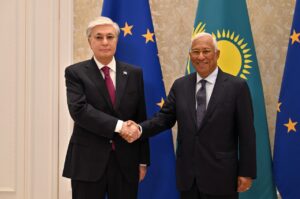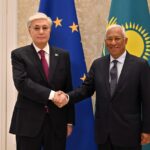History Repeats Itself: Europe’s Struggle for Strategic Relevance
In 1878, at the Congress of Berlin, Otto von Bismarck famously remarked, “I shall be happy to see Europe strong and prosperous, but I shall never be a party to its decay.” He understood that power and influence in international politics are not given but earned through strategic foresight and unity. Fast forward to today, and Europe finds itself once again sidelined, this time in global diplomatic negotiations regarding Ukraine and its broader role in the shifting geopolitical landscape. While Europe remains one of Ukraine’s primary supporters, its lack of a coherent and unified strategy has diminished its influence on the world stage.
Key Developments of the Week
1. Europe Sidelined in Ukraine Negotiations
Despite being one of the largest financial and military supporters of Ukraine, Europe has found itself relegated to the sidelines in major diplomatic discussions regarding a potential settlement. The fundamental issue remains Europe’s lack of a unified stance. While some nations advocate continued military and financial support, others hesitate, wary of escalation or economic repercussions. This strategic paralysis has led to a default policy: continued support without a clear long-term vision.
Why is this happening?
- The EU lacks a single, centralized foreign policy doctrine, leaving major decisions fractured among national governments.
- The upcoming European elections have made leaders cautious about making bold moves.
- The U.S. shift in global focus is leaving Europe with reduced influence in high-level diplomatic affairs.
The result? A policy of inertia, where European leaders keep the status quo afloat without clear direction. The lesson from the Congress of Berlin remains relevant: without clear leadership, Europe risks being a spectator rather than an architect of its future.
2. U.S. Strategic Shift: Isolating China by Engaging Russia?
As the U.S. reorients its foreign policy towards countering China’s rise, talks between Washington and Moscow have intensified. While official rhetoric maintains hostility toward Russia, there are emerging signals that the U.S. is reconsidering its long-term approach, seeking to pull Russia away from its growing alliance with China. Echoing the Cold War-era Kissinger doctrine, this strategy is reminiscent of the U.S. rapprochement with China in the 1970s to counterbalance the Soviet Union.
What’s driving this shift?
- The U.S. recognizes that its ideological approach—favouring liberal democracies—puts it at a disadvantage in a world where China pursues a purely transactional foreign policy.
- Washington’s economic and military resources are stretched thin, forcing it to prioritize one major adversary.
- Russia, despite its current adversarial position, may become a crucial balancing actor if pried away from China.
Napoleon Bonaparte once said, “A leader is a dealer in hope.” The U.S. is playing a high-stakes diplomatic game, hoping that Russia’s long-term strategic interests might be realigned. If successful, it could drastically shift the power balance in Eurasia. However, Europe remains largely absent from this discussion, further eroding its relevance.
3. Europe’s Existential Dilemma: The Need for a Coherent Strategy
The main takeaway from this week’s developments is that Europe must urgently redefine its foreign policy direction. If it wishes to remain a relevant global actor, it needs structural reforms in how it conducts diplomacy, defence, and international engagement. The EU’s chronic inability to act decisively in major crises—whether in Ukraine, migration, or strategic autonomy—has rendered it a secondary player rather than a primary decision-maker.
Key areas for urgent reform:
- A unified EU foreign policy: Moving beyond fractured national interests to a common geopolitical strategy.
- Defence integration: Reducing dependence on NATO and enhancing Europe’s own military capabilities.
- Strategic autonomy: Developing economic and political resilience independent of U.S. shifts in policy.
Without these changes, Europe risks remaining a reactive rather than proactive power, consistently adjusting to external pressures rather than shaping global events.
Keep Your Eyes Open
As geopolitical tides shift, Europe faces a critical juncture. Key events to watch in the coming weeks:
- Ongoing U.S.-Russia backchannel talks – Any movement here will signal the direction of future U.S. strategy.
- EU leadership discussions – Will there be any momentum for a more unified foreign policy?
- Chinese diplomatic activity – Beijing’s next moves could indicate how it plans to counter U.S. manoeuvres.
Bismarck’s warning still echoes today: A divided Europe is a weak Europe. The coming weeks will determine if its leaders rise to the occasion—or continue to drift.











